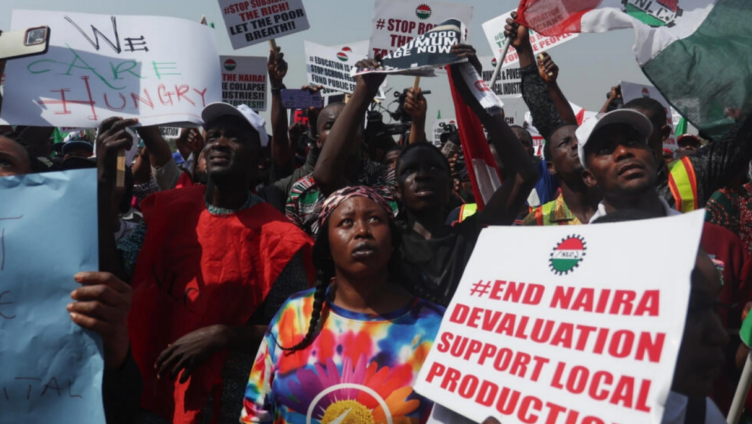Demonstrators hoped nationwide protests called by the Nigeria Labour Congress (NLC) umbrella union would pile pressure on the government, which brought in reforms last year that have had a devastating effect on citizens of Africa's biggest economy.
As inflation skyrockets, many poor Nigerians have had to skip meals and give up products such as meat, eggs and milk.
Over 1,000 demonstrators marched on the National Assembly in the capital Abuja, watched over by vigilante groups and armed police.
The protesters chanted and carried signs saying "Let the poor breathe" and "End naira devaluation".
"The government needs to wake up," said protester Roland Bamiche, who works for a hospitality union.
"People are dying, people are suffering, people are going through hell," the 45-year-old said. "The high cost of living is becoming unbearable."
Since coming to office last year President Bola Ahmed Tinubu has ended a fuel subsidy and currency controls, leading to a tripling of petrol prices and a spike in living costs as the naira has slid against the dollar.
The inflation rate reached a three-decade high of almost 30 percent in January, according to the national bureau of statistics.
Tinubu has called for patience to allow his reforms to take effect, saying they will help attract foreign investment, but the measures have hit Nigerians hard.
"Tinubu promised a change but now look where we are," said activist Aghedo Kehinde Stephen in Lagos where more than 1,000 people also turned out.
"There is no food and no security in the country."
'Reduced to beggars'
In the north, the economic crisis has forced people to eat poor-grade rice used as fish food.
To feed their children, women have even resorted to digging up anthills in search of grain stored by the insects, videos on social media show.
Hundreds of demonstrators marched to the governor's office in the northern city of Kano, the capital of a key state which also bears the same name.

"The population has been reduced to beggars. The government must take drastic measures," said protester Saudatu Ibrahim.
The government says it is working to address the crisis and on Tuesday Nigeria's central bank announced it was raising interest rates by four percentage points to 22.75 percent in a bid to tame inflation.
"We need prices to come down," said NLC worker Mercy Adeyemi at the Abuja demonstration.
The price of rice has more than doubled in the past year and the 48-year-old mother of four said she has been missing meals to make ends meet.
Protests have already taken place across the country this month and are set to continue tomorrow.
Latest Stories
-
Paris 2024: Opening ceremony showcases grandiose celebration of French culture and diversity
3 hours -
Spectacular photos from the Paris 2024 opening ceremony
4 hours -
How decline of Indian vultures led to 500,000 human deaths
4 hours -
Paris 2024: Ghana rocks ‘fabulous fugu’ at olympics opening ceremony
4 hours -
Trust Hospital faces financial strain with rising debt levels – Auditor-General’s report
5 hours -
Electrochem lease: Allocate portions of land to Songor people – Resident demand
5 hours -
82 widows receive financial aid from Chayil Foundation
5 hours -
The silent struggles: Female journalists grapple with Ghana’s high cost of living
5 hours -
BoG yet to make any payment to Service Ghana Auto Group
5 hours -
‘Crushed Young’: The Multimedia Group, JL Properties surprise accident victim’s family with fully-furnished apartment
6 hours -
Asante Kotoko needs structure that would outlive any administration – Opoku Nti
7 hours -
JoyNews exposé on Customs officials demanding bribes airs on July 29
7 hours -
JoyNews Impact Maker Awardee ships first consignment of honey from Kwahu Afram Plains
8 hours -
Joint committee under fire over report on salt mining lease granted Electrochem
8 hours -
Life Lounge with Edem Knight-Tay: Don’t be beaten the third time
8 hours

